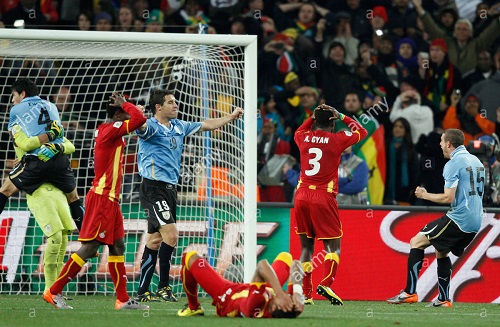If there is a spirit that has perpetually haunted Ghana football and bittered the feeling of this football-crazy nation for years, it’s certainly a spirit that lies from just twelve yards.
The penalty shoot-out curse.
“How difficult is it to score from a penalty� A fan in visible pain quizzed at the Sweet Touch Pub in Sunyani, where I watched the final of the 2015 African Cup of Nations between Ghana and Ivory Coast.
Afriyie Acquah, Razak Braimah and Frank Acheampong had all missed their spot-kicks to hand the title to Ivory Coast despite the Elephants missing the first two.
The irritated Ghanaian fan may be right to question.
How can standing to shoot a ball from just some few metres away from a post of size 24 feet by 8 feet, that creates an opening that covers 192 square-feet be that a daunting task?
That goal post, according to a Sports Science, is larger than a cargo container, which measures 20 feet, by slightly less than 8 feet.
You may argue about the presence of a goalkeeper as an impediment, but on average, a keeper needs about 100 milliseconds just to process the kick mentally and another 100 milliseconds to decide where to jump and initiate the muscle movement. Imagine that it then takes over 700 milliseconds to jump and reach one side of the goal. By that point the ball is already halfway to the goal.
The kicker certainly has the upper-hand always. What an easy task, it appears.
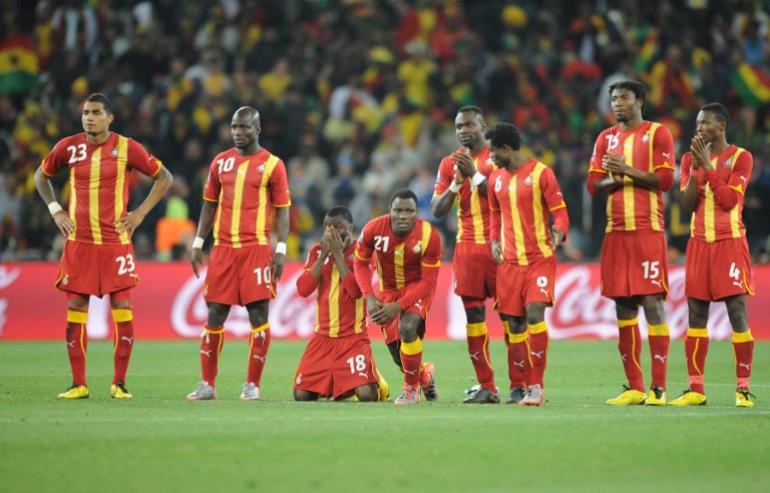
Black Stars players left disappointed after losing on penalties to Uruguay at the 2010 FIFA World Cup in South Africa
But strange as it may sound, this job is obviously the most difficult skill for many Ghanaian footballers since time immemorial.
There have been a countless number of days and nights where the whole of Ghana’s population has been thrown into a state of mourning from the perennial penalty woes.
Last night, Ghana’s adorable Black Maidens had managed to attract a slew of Ghanaian eyeballs following their impressive display at the 2018 Women’s U-17 Championship in Uruguay.
They came up against Mexico for a place in the semi-finals and at 2-2 in after regulation time, match came down to penalties.
I tweeted “Down to Ghana’s nemesis. Penaltiesâ€.
Just like many Ghanaians, I felt it. It usually ends in heartbreaks for Ghana at that point, and it did.
Like a script, penalty shoot-outs have long provided dramatic climaxes to Ghanaian National Teams and clubs in local and international competitions.
This common football skill has serially caused a manifold of pain over the year. Nonetheless, no clue has been found. No successful prognosis has ever been conducted let alone, a remedy. After all, it is a luck, and down to lottery, as we claim. And nobody has ever had a remedy to luck.
Thus, this particular football stretch may continue to haunt generations, if indeed, it is our evil spirit.
Ghana’s status in African football is mammoth, with four titles in the African Cup of Nations and a couple in club and junior competitions.
But I daresay that, there would have been a cornucopia of trophies in the cabinet of Ghana National Teams and clubs but for this blue canker. History is bare on our shoot-out misses.
It is not like we have not celebrated from the glory of it before – but little did we know that Samuel Opoku Nti’s penalty kick in the 1982 African cup final – that went the bottom left corner of Libya’s Ramzy Al Kouafi’s post, was going to be the last ever penalty kick to spark wild jubilations across this country.
Since that night of 36 years ago, it has been heartbreaks and agony from one penalty shoot-out, to another. It has become so obviously terrorizing and inescapable in Ghana’s context.
Whiles other teams can have the luxury of literally wasting time in a gratified anticipation of penalty a session, that bout is also Ghana’s deadliest nemesis at the recall of its memories.
Exactly 10 years after the sweet taste of Libya 82, Ghana with a plethora of great players lined-up in the finals of that tournament again. The 1992 African Cup of Nations in Senegal.
That was Ghana’s tournament to lose. Facing neighbours Ivory Coast in the final, the two sides could not account for a goal in regulation time. In the post-match penalties, Ghana missed one kick in the first 10 but in sudden death, nobody knows what happened to Tony Baffoe’s legs.
Same legs he brilliantly scored his first attempt. That was too heartbreaking to take; The penalty ghost had visited.
Not many months later, the penalty blues extended cold bathes on Ghanaian club football as well.
Giants Asante Kotoko came close to winning the CAF Champions League for the third time. After playing to a goalless draw against Zamalek in Kumasi, the Porcupine Warriors were able to hold the ruthless Egyptians in Cairo. There was even an opportunity in open play for Kotoko when the referee awarded the Porcupines a penalty in Cairo, but Kotoko’s Seidu Yussif missed his kick. After 120 minutes, the game ends and to post-match penalties to decide.
Both clubs converted their first five kicks with players like George Arthur, Frimpong Manso, Sarfo Gyamfi and others netting for the Ghanaians. In the sudden death, rugged defender Edward Agyemang-Duah blasted wide. Zamalek won 7-6 in the end. Ghana and Kumasi became dead silent on that Friday night. Ghana’s penalty ghost had visited again.
Less than four years after Kotoko had fallen to the disease, another Ghanaian side, Obuasi Goldfields (now AshantiGold), were presented with a glorious opportunity to reverse the trend and win the same trophy when they faced Morocco’s Raja Casablanca in the 1997 CAF Champions League.
At aggregate 2-2 after 120 minutes, Raidhi Belmamoun’s kick was saved by Nibombe Wake, the Togolese goalkeeper of the Obuasi side. But then, the same Emmanuel Agyeman-Duah whose tears could fill the sea when he missed Kotoko’s kick four years earlier, would miss again, to hand the title to Raja.
The cameras focused panned on Goldfields’ coach, the late Herbert Addo, standing akimbo on the touchline and shaking his head. Duah, face down and holding his waist, as if enchanting for the ground to open up and swallow him. Goldfields had lost a legendary opportunity to inscribe their name on the African Club football golden list, via Ghana’s penalty jinx.
In 1999, Ghana’s youth team had excelled beyond doubt in the FIFA World Youth Championship in Nigeria.
Ghana lined up against Xavi Hernandez led Spain in the quarter-finals.
Ghana were losing 1-0 but on the stroke of full time, Peter Ofori Quaye equalized. The country came alive. But a certain Hamza Mohammed stood before Ikar Casillas during the post-match penalties, to score and win it for Ghana.
But then our leader Hamza Mohammed looked up and took his ball to the skies. That night, tears abound. Ghana broken again, by a familiar visitant.
Tears had not dried up from that pain in 1999 when the Ghana U-17 team lined up in New Zealand displaying some great stuff. The starlets were losing 2-0 to Brazil with 20 minutes to go in the semi-final.
Ishmael Addo and Nathaniel Lamptey restored parity and the stakes looked high for the Ghanaians but in the post-match penalties, Only Michael Essien and Emmanuel Nkrumah could score from the five kicks. An overzealous nation went heartbroken. The penalty ghost will not show any mercy. Not even to these little ambitious lads.
Remember the nation’s double heartbreak in the 2004 CAF Champions league. Two of Ghana’s most glamourous clubs Kotoko and Hearts of Oak stood a metre away from the prestigious ‘Money Zone’ of the CAF Champions League but on Saturday night in Sousse, Hearts of Oak had held the Tunisian side Etoile to penalty kicks after brilliant defensive displays. But here, the Phobians had dug their own grave. After expertly converting all their 5 kicks, Etoile’s Nigerian goalkeeper Austin Ejide saved Benard Don Bortey’s kick to take his side through.
Twenty-four hours later, Asante Kotoko could not cage the ghost that devoured their sworn rivals. Kotoko had beaten USMA of Algeria 2-0 to level aggregate at 2-2 but the North African side had the last laugh at the Kumasi Sports Stadium in the post-match shoot-outs. Stephen Oduro and Michael Ofosu Appiah, as if mystified by an evil spirit, shot feebly into the hands of goalkeeper Abdouni Nerouane.
That afternoon, I quizzed that; If indeed penalty shoot-outs were a lottery, why doesn’t Ghana win any?
And more so why does this kind of lottery tend to favour all our opponents despite our class in the sport?
The Ghana penalty devil never excuses its callousness even to the compassionate side of gender.
Ghana’s Women’s team, the Black Queens were now at the mercy of it. The Queens had a chance day to qualify for the 2008 Olympic Games if they could clear Nigeria from their way.
That afternoon in 2006, the Accra stadium was filled to rafters after a decision to allow students to enter for free, and cheer the queens to victory against her greatest enemy.
With 90 minutes approaching and penalties approaching, there came the real enemy. The Black Queens could only convert two out of five and Nigeria came 4-2 winners. The haunt was on, and the ghost had shown it was no gender exclusive.
Two months after the Queens disastrous collapse from the spot, another penalty decider involved Ghana’s U-20 side in October. The Satellites up against Burkina Faso in the 2007 African Youth Qualifiers at the Sunyani Coronation Park.
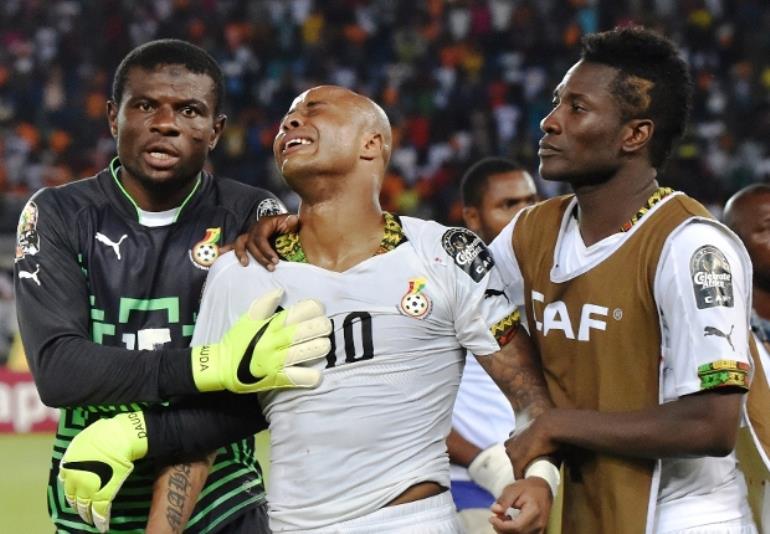
Andre Ayew could not hold back his tears after Ghana lost on penalties to Cote d’ Ivoire in the finals of the 2015 Africa Cup of Nations
The Burkinabe’s had beaten Ghana 1-0 in Ouagadougou. Renovation at the Accra and Kumasi Sports Stadiums meant the game was moved to Sunyani Coronation Park.
Kwadwo Asamoah scored to make it 1-1 on Aggregate. During the post-match penalties, I observed the Ghana coach, Oti Akenten open his bible to read pray as the kicks began. Not even that biblical incantations could prove enough to wrestle Ghana’s destiny from the evil hands of penalties.
Opoku Agyeman, playing at a venue he cut his footballing teeth, missed Ghana’s last kick to send the Burkinabe’s through.
At this point, it appears no country had a worse record than Ghana in shoot-outs, which is why in 2008, the then GFA President Kwesi Nyantakyi, after watching the Olympic team falter again at shoot-outs vrs Sudan in an Olympic Qualifier, called for a critical consideration of the serial failing which to him, “has become systemicâ€.
Then came the oasis in the desert, the 2009 World Youth Champions final, when Agyeman Badu successfully planted his ball with the coolest of composure to send the whole country into a frenzy, it appeared Ghana had finally overcome the wight.
Ghanaian teams had won, up to that point, just two of their past 15 shoot-outs. That should have marked the end in sight of the enemy. But alas, the cancerous art would come back to life again, sooner and crazier.
Reeling from the pains of the past, Ghana with an exciting crop of talented players, seamlessly qualified for the FIFA world cup in 2010, a year after winning the U-20.
Expectations had skyrocket. Ghana then lives up and equals a record for being the only third country from Africa to reach the quarterfinals at the Mundial.
There was then, an even enviable opportunity to set a new continental record of reaching the semi-finals and possibly win it.
Here the West Africans come face-off with South American juggernauts, Uruguay. With the scores still at 1-1 after 119 minutes, Uruguayan Luis Suarez intentionally handles an Adiyiah goal-bound header and so a penalty is awarded. Ghana is one minute away from its greatest football achievement. But only if it can navigate past its greatest football enemy, the penalty.
Ghana put forward the best penalty taker forward. With 1 billion fans in support, the ghost decides to rear its ugly head at the golden moment.
Gyan’s effort hit the bar. Ghana’s World Cup had not died. A lifeline in the post-match shootouts.
Ghana missed two and ended a hitherto glories campaign a bitterest of notes.
There were a couple of high profile heartbreaking misses from shootouts for Ghanaians in that period, including New Edubiase’s fall in Congo in the CAF Confederations Cup. A fall from a familiar spot.
But then come another big one in the 2012 African Cup of Nations
Ghana were to beat Zambia in the Semi-Finals but Gyan again had become mincemeat for the uncharitable penalty ghost. Ghana were bundled out and from the same disease.
Barely Twelve months later, Black Stars primed to annex their 5th African Cup trophy come up against Burkina Faso in the Semi-Finals hosted in South Africa. That night in Nelspruit was one of the coldest.
The devil was lurking around the Mbombela stadium. Ghana hasn’t still been able to cast away the ghostly spell of penalties when Emmanuel Clottey and Isaac Vorsah offered themselves up.
It has become a painful routine, but the most devastating of recent penalty heartaches was the final of the 2015 African Cup of Nations in Equatorial Guinea. Ghana had been the best team at the tournament and destined to end the trophyless jinx. But after a goalless draw vs Ivory Coast, the opponents in the 1992 finals, the two settled for the shootouts. Ivory Coast missed their first two, throwing the game wide in Ghana’s favour.
But lo and behold, Ghana will miss three more, to ensure the trophy come home no more. Down to the shoot-out ghost. The lottery that we barely win.
Few years ago, I watched a documentary on German Football chiefs paying for a great deal of research interest in penalty taking in football.
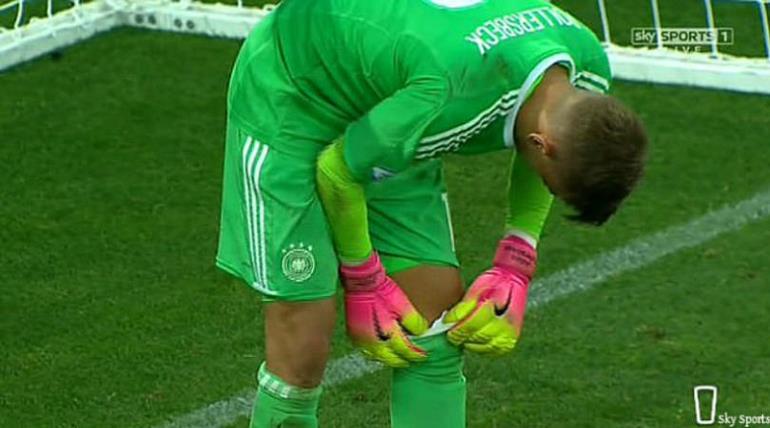
Germany goalkeeper uses notes as U21s beat England on penalties
The research somehow began around 1988 and spanned over 6 years. The studies eventually became a course of study and application in the various soccer schools in the country, according to the file.
The scientists collected statistics from penalty shoot-outs at every World Cup, African Cup of Nations and European Championships etc and also reviewed 140 matches in some 18 international competitions across 16 countries. In all, over 2,000 penalty kicks were placed under research.
It all was a simple process. The German Football Analysts wanted to answer a FAQ – “Is a penalty kick an art of science or purely a kick of luck?â€
After collating the data, research proved that element of luck may count in everything, no doubt but more profoundly, those who think that penalty shoot-out come down to luck must have a rethink.
Statisticians, Prozone, analyzed and made several conclusions in their book, “the science from 12 yardsâ€. The study focused on the question, “Who is in control- the kicker or the keeperâ€
This research has been very instrumental in helping German National Teams and their clubs winning very crucial competitions and tournaments from penalties.
They actually study the art from academies and thoroughly teach it from grassroots. In selecting the best penalty takers for their teams, the German’s would go as odd as examining the shape of a player’s leg, the size of their foot and the formation of their bodies (centre of gravity, differences in upper body and lower weight).
This has worked almost perfectly for Germany, establishing them as a country with a fearsome spot-kick reputation.
By consulting that research and various others instituted by the German Federation years ago, German technical staff spend days, making painstaking efforts in reviewing opponents ahead of every game in tournaments.
They’ll prepare a list containing the record of each opponent penalty taker’s preferred part of the goal target. This information they use to enhance the probability of saving penalties and the effort have worked out almost all the time for Germany.
In 1996 Euros, as Germany eliminated England via penalties, the goalkeeper was seen consulting notes on a sheet of paper hidden in his socks.
At the 2006 World Cup, goalkeeper Jens Lehmann had a small book of penalty tips which he consulted to help his country beat Argentina on penalties.
At the recent Euro U-21 Championships, England came up against Germany in finals. Before every England kick, the German U21 goalkeeper Julian Pollersbeck consulted what appeared to be some notes that were cleverly tucked away in his shorts. The notes showed him where to dive depending on a weaker foot of the taker and the movement before the kick. He saved 3 and they won.
Through that scientific approach to the art and other factors, records say Germany have never lost a penalty shootout in World Cup history, having missed only one penalty from 18 kicks at the World Cup since 1982.
From FIFA’s official record of national team penalty conversion rate, countries like Germany, Mali and Czech Republic have over 85% success, compared to Ghana’s 21% in international competitions
I don’t think this is by luck or lottery. They invested in perfecting the art and results prove it has paid off.
Despite Ghana’s incredible talent in the sport, the country’s national teams and its clubs have suffered the most devastating heartbreaks from penalty kicks in competitions. It’s a tale as old as time.
The Black Maiden’s exit from the shoot-outs on Sunday night was coincidentally preceded by the Ghana CHAN team being beaten by Namibia, also on penalties, a few hours earlier, and the debate about whether or not penalties are lotteries or science will resurrect.
Majority of the Ghanaian technical men who have previously commented on the topic have confidently postulated that it’s a game of luck and many still describe it as a lottery.
Coach Evans Adotey was heard in his post-match interview emphasizing how he has practised penalty shoot-outs with the Maidens from their Prampram base in Accra all the way to Montevideo. His disappointment laid bare.
But when coaches in Ghana say they are practising penalties, it is a matter of merely taking turns to shoot at training grounds and seeing who scores the most and who misses the lost or there is more?
Do we have the logistics, technical expertise and capacity to apply any sort of science, psychology and statistics?
Before the 2018 World Cup, England were Ghana’s allies as countries with the worst shoot-out jinx. But the English have never relented in the fight to end the hoodoo.
FA technical director Dan Ashworth had told reporters Gareth Southgate and his stars have carried out a forensic-style scientific study into penalty-taking psychology.
They engaged a research team that broke down the whole process – from the dreaded walk to the spot to reactions to scoring from a successful kick. In the end, England can say it paid off.
If there is one thing that Ghana should be really be determined to drill into the preparation of its teams, it is that penalty shoot-outs are not decided by chance, by luck, or lottery as many of our coaches have unfortunately asserted.
There a scientific drill to being master at it both as a taker or keeper.
Goalkeeper Ben Foster made headlines during the 2009 Carling Cup final when the then-Manchester United keeper watched a video of Tottenham Hotspur’s penalty takers on his iPod in the moments before the shoot-outs.
Also, After correctly guessing the direction of all five penalties in the Blues’ Champions League triumph in Munich, Petr Cech revealed that, he had watched a two-hour DVD of every penalty taken by a Bayern player since 2007, while Huddersfield Town’s Alex Smithies had notes taped to his water bottle during the marathon League One play-off final shootout vs Sheffield.
As well as the scientific and technical aspects of improving the rates of conversion, an International Football Agency, Prozone Sports also cements the fact that the art of penalty taking is not just a lottery.
It has more to do to having it right. Prozone statistics provides insight regarding the direction and results of penalties. It analysed the success rates of different groups of players and the contrasts between kicks taken at different stages of shootouts. It was discovered that attackers converted 79.5% of their penalties, with midfielders and defenders trailing at 63.2% and 63.3% respectively, while the physical condition of players also appears to have some effect on performance. Penalty takers who had played more than ninety minutes scored just 66.3% of their kicks, whereas those who had played between 45 and 90 minutes fared the best with a conversion rate of 75%.
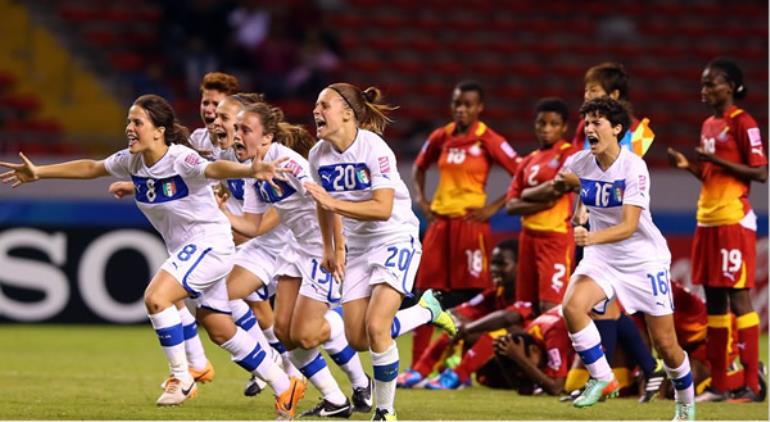
Italy beat Ghana on penalties at the quarterfinals of the 2014 FIFA U17 Women’s World Cup
Its data also reveal that, although placement affords the taker greater control over their penalty, powerful shots are more difficult for goalkeepers to read and react to. However, players opting for power should be wary of taking a long run-up as ‘keepers guessed correctly on 54% of the penalties where the player began their approach from outside the area, run-ups from the edge of the box being pre-empted just 40% of the time. With that in mind, it is possible to call on the data to construct a hypothetically ideal penalty kick.
The scientific and statistics facts blatantly indicates that it is a great deal more of science than art when it comes to converting successfully from 12 yards.
There have been so many missed penalties by players wearing Ghana shirts and the trend has inevitably traumatised others when it comes. It has become the elephant in the room, with news conferences at major tournaments rarely passing by without one or two reporters asking the “Have you practised penalties?†question!
Time for Ghana Football chiefs to, either by revolution, find a remedy. If we cannot execute the job within 90 minutes, we should be ready to go into depth deep to invent a way to end the hoodoo or play the luck or lottery card, and allow it to devour us forever.
Source: Saddick Adams

